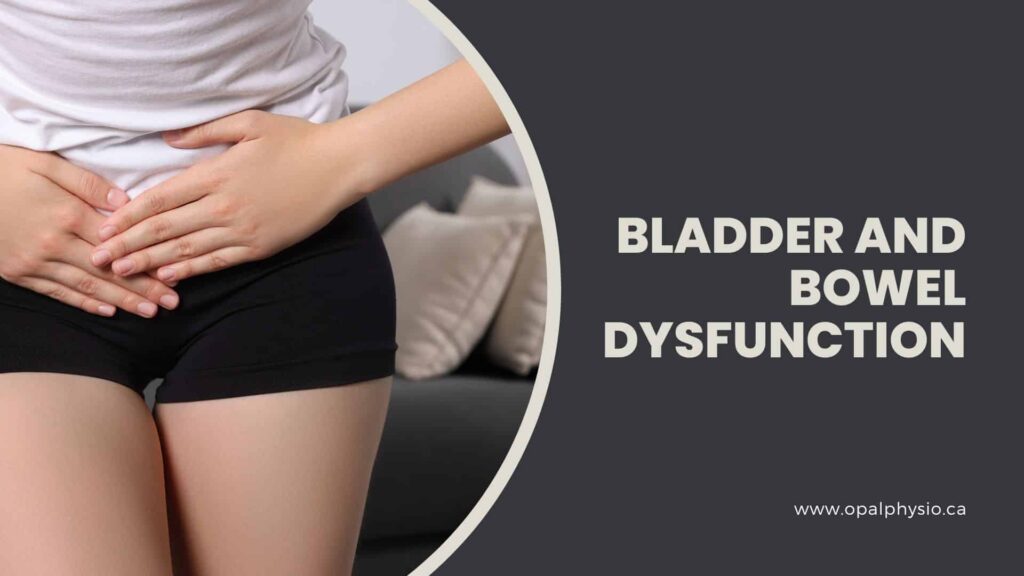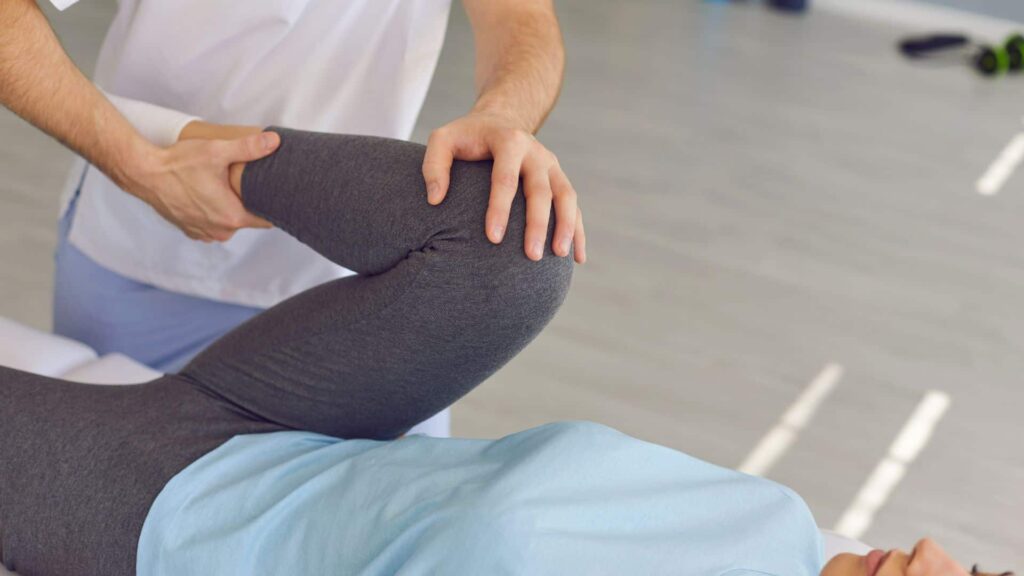Bladder And Bowel Dysfunction Physiotherapy Treatment
Bladder and bowel dysfunction can significantly impact a person’s quality of life, causing embarrassment, discomfort, and pain.
Our clinic provides comprehensive bowel and bladder dysfunction treatment through pelvic floor physiotherapy.
Our team of experienced physiotherapists understands the challenges faced by those suffering from these conditions, and our therapists are committed to helping them achieve optimal function and improved well-being.
We use evidence-based techniques and personalized treatment plans to address the root cause of your bladder and bowel dysfunction condition and help you regain control of your bodily functions.

Experiencing bladder and bowel dysfunction? Our physical therapist can help!
Physiotherapy can be an effective way to manage these issues. Our skilled physiotherapist can work with individuals to identify the root cause of their bladder and bowel dysfunction, develop a personalized treatment plan, and provide education on techniques such as pelvic floor exercises to strengthen the muscles in the pelvic region.
With the help of our pelvic floor physiotherapist, individuals can improve their bladder and bowel function and regain their confidence and comfort in their daily lives.
What are bladder and bowel dysfunctions?
Bladder and bowel dysfunctions are conditions that can impact a person’s ability to control their urinary and fecal elimination appropriately. This can include:
Bladder Dysfunctions
- Stress Urinary Incontinence
- Urgency
- Urge Urinary Incontinence
- Urinary Frequency
- Urinary retention
- Overactive bladder
Bowel Dysfunction
- Constipation
- Diarrhea
- Fecal incontinence
- Irritable bowel syndrome (IBS)
- Inflammatory bowel disease (IBD)
- Rectal prolapse
Causes of bladder and bowel dysfunctions
The causes of bowel and bladder dysfunctions can vary depending on the specific condition, but some common causes include the following:
- Age-related changes in the muscles and nerves controlling bladder and bowel function
- Pelvic floor muscle weakness or injury
- Neurological disorders such as Parkinson’s disease or multiple sclerosis
- Spinal cord injury
- Chronic constipation or diarrhea
- Inflammatory bowel disease (IBD)
- Prostate problems in men
- Stress or anxiety
- Poor dietary habits and lifestyle factors
Risk factors of bladder and bowel dysfunctions
- Age – the risk of bladder and bowel problems increases with age.
- Gender – women are more likely to develop certain bladder and bowel dysfunctions.
- Family history – some bladder and bowel conditions may have a genetic component.
- Pregnancy and childbirth – can cause changes in pelvic floor muscles, causing muscle dysfunction.
- Chronic constipation or diarrhea.
- Inflammatory gastrointestinal conditions.
- Certain medications or surgeries.
- Obesity or being overweight.
- Sedentary lifestyle, smoking or alcohol consumption.

Pelvic floor physiotherapy for bladder and bowel dysfunctions
Physiotherapy can play a significant role in managing bladder and bowel dysfunctions. Pelvic physiotherapy can help with
Pelvic Floor Muscle Training: Physio can provide pelvic floor muscle training, which involves exercises to strengthen and coordinate pelvic muscles. This can help manage urinary and fecal incontinence, bladder and bowel urgency and frequency.
Bladder and Bowel Retraining: It involves establishing a regular toilet use schedule and reducing voiding accidents. Our therapists can guide you on establishing a toilet routine and managing any symptoms of urgency or frequency.
Education and Lifestyle Modification: We provide education on healthy bladder and bowel habits and lifestyle modifications, including dietary modifications, fluid management, and exercises to improve overall physical health.
Electrical Stimulation: Electrical stimulation is a technique that involves applying electrical currents to the pelvic floor muscles. Our therapist may use this approach to help strengthen the muscles and improve their function, leading to improved bladder and bowel control.
Manual Therapy: Techniques such as soft tissue massage and joint mobilization are provided to help manage bladder and bowel dysfunctions. These techniques help reduce muscle tension and improve pelvic mobility, improving bladder and bowel function.
Physical therapists experienced in bladder and bowel dysfunction in Langley can work with individuals having pelvic floor muscle weakness or muscle tension related to pelvic floor muscles.
At Opal Physio, our physiotherapists use assistive devices like biofeedback to improve pelvic floor muscle function. In addition, we can provide education on bladder and bowel retraining techniques and pelvic floor muscle exercises to help achieve continence.
Contact us if you are experiencing any bladder and bowel dysfunction issues.
